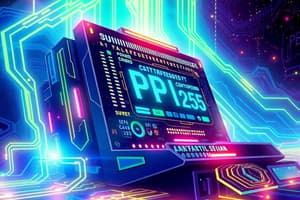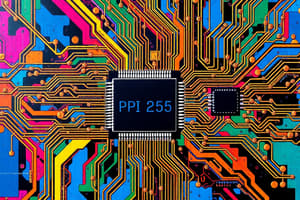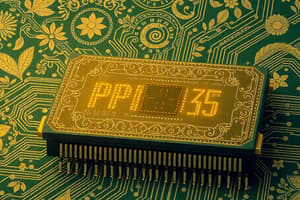Podcast
Questions and Answers
What is the purpose of the pinMode function in the Arduino code?
What is the purpose of the pinMode function in the Arduino code?
- To delay execution of the program
- To read the value from a pin
- To define the state of a pin as either input or output (correct)
- To turn an LED on or off
In the digital input example, what happens when the pushbutton is closed?
In the digital input example, what happens when the pushbutton is closed?
- The input pin reads LOW
- The input pin reads HIGH and turns on the LED (correct)
- The LED blinks at a high frequency
- The LED turns off immediately
Which component is used to control high current loads in Arduino projects?
Which component is used to control high current loads in Arduino projects?
- Capacitor
- MOSFET or transistor (correct)
- Diode
- Resistor
Which function in the code is used to keep the LED on for a second?
Which function in the code is used to keep the LED on for a second?
What is the maximum current output of the Arduino's standard digital pins?
What is the maximum current output of the Arduino's standard digital pins?
What does the digitalWrite function do in the examples provided?
What does the digitalWrite function do in the examples provided?
What variable is used to represent the LED pin in the digital output example?
What variable is used to represent the LED pin in the digital output example?
How does the code control a MOSFET to manage higher current loads?
How does the code control a MOSFET to manage higher current loads?
What is the role of the void setup() function in Arduino programming?
What is the role of the void setup() function in Arduino programming?
Flashcards are hidden until you start studying
Study Notes
Interfacing of I/O Devices
- Various devices can be interfaced with microcontrollers, enhancing their interaction capabilities.
- Manipulating microcontroller ports allows for data input (from sensors) and output (to actuators).
Digital Output
- A basic program to toggle an LED on and off demonstrates digital output.
- LED connected to pin 13 blinks every second using
digitalWritefunction. - Built-in resistor for pin 13 allows direct connection to an LED without additional circuitry.
Digital Input
- Digital input has two states: HIGH (on) and LOW (off).
- Example uses a pushbutton connected to pin 2; closing the switch reads HIGH and activates the LED on pin 13.
digitalReadfunction checks the state of the input pin to control the LED.
High Current Output
- Controlling loads over 40mA from Arduino requires using a MOSFET or transistor for handling higher current.
- Example turns a MOSFET on and off five times per second to control a motor.
- Implementation may include protective components like a diode for non-inductive loads.
Analog Output
- Example demonstrates controlling LED brightness using PWM (Pulse Width Modulation) via
analogWrite. - Variable
delayVal()can be used to modify brightness dynamically. - Loop structure allows for gradual changes in LED intensity, enhancing visual feedback through gradual dimming effects.
Studying That Suits You
Use AI to generate personalized quizzes and flashcards to suit your learning preferences.





